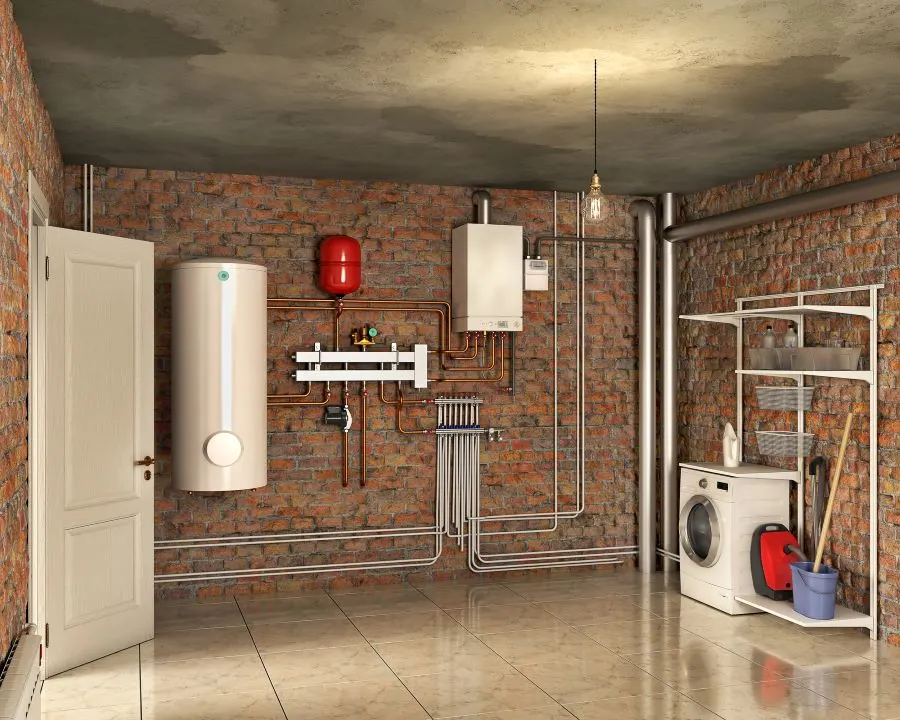If you’re looking to upgrade your water heater, an indirect model may be the way to go. Indirect water heaters cost less and last longer than traditional tank-style water heaters. They harness the heating power of your home’s boiler or furnace to heat the water, killing two birds with one stone.
But an indirect water heater only lasts to its potential with regular replacement of its anode rod. Indirect water heaters require anode rods to fight corrosion within their tank unless the tank is made of non-corrosive materials.

Indirect water heaters use an alternative heating source, not gas or electric. However, they still have tanks. When the tank is made of glass-lined steel (most common), an anode rod is required. If it is made from stainless steel or thermoplastic, then an anode rod is not required.
Anode Rods Protect Tanks Containing Water
An anode rod is a metal rod that protects a standard water heater tank from corrosion. The rod is made of highly reactive metals, such as magnesium, aluminum, and zinc. These take the brunt of the corrosive elements in water, leaving the steel tank safe from corrosion.
After about five years, an anode rod will completely corrode inside a water heater. It is essential to replace an anode rod before they are fully spent to avoid having rust or build-up problems in the tank.
When I say a standard water heater, I mean the variety which is most common in residential homes. This is a glass-lined, tank-style water heater. While the internal fiberglass lining of these units helps the steel outer tank resist corrosion, there are often small hairline cracks in the lining that allow water through.
There are alternative varieties of water heaters that do not have a tank, and they do not require anode rods. Tankless water heaters don’t store and heat water but rather heat water directly as it is needed.
Indirect Water Heaters Still Have Water Tanks
Indirect water heaters are a slightly different style of water heater to tank-style or tankless water heaters. Rather than having a direct gas or electric power source heating water from within the tank, they rely on a separate boiler system to heat the water. I have written an article detailing the differences between a water heater and a boiler if you are interested in learning more.
Many homes already use a boiler system for heat during the winter. Indirect heater tanks are sold separately from the boiler system so that you can use what you already have if possible.
The boiler heats up a fluid that runs through a coil system in the water heater to heat the water through heat exchange.
Indirect water heaters are more energy-efficient than traditional tank-style water heaters because during the winter months you already have the boiler running. It allows you to use one machine for two jobs. Additionally, indirect heaters don’t lose heat like direct heaters do to exhaust.
Even though the water is heated through a different system, indirect water heaters still require a tank. This tank is often made with the same materials as standard tank-style water heaters; they often have a steel shell with an internal glass coating.

Since this tank system is the same as many standard water heaters, it still requires an anode rod to resist corrosion. Otherwise, the highly corrosive environment of the hot water will have corrosive effects on the walls of the tank over time.
With regular anode rod replacement, indirect water heaters have longer lifespans than direct heated tank-style water heaters since they face less wear from the heat source over time.
Exception
Not all indirect water heaters require anode rods depending on the tank material. Stainless steel indirect water heater tanks are a durable option that does not require an anode rod
Stainless steel is made of a steel alloy that must contain at least 10.5% chromium. Chromium prevents rust and corrosion in steel by reacting with oxygen to create a protective barrier over the surface of the metal.
Stainless steel indirect water heaters therefore often come with a lifetime warranty since they are highly durable and at low risk of corrosion.
There is another type of material that negates the need for an anode rod in an indirect water heater tank. There are heavy-duty thermoplastics being used to create water heater tanks that do not need an anode rod, since plastic is not at risk of corrosion.
Plastic water heaters may seem like an attractive option due to cost, but they have some downsides compared to stainless steel. Stainless steel is a more durable material that requires less maintenance since the metal parts within a plastic tank need to be serviced regularly.
Lifespan of Anode Rods in Indirect Water Heaters
Anode rods used in indirect water heaters are made of the same materials as anode rods used in regular tank-style water heaters, and they perform the same job. Therefore, they have around the same lifespan.
The lifespan of an anode rod is about five years, but it should be checked every three years to determine if they need to be replaced.
There are also powered anode rods, which are permanent fixtures that do not need replacement. They use electricity to subvert the corrosive effects of a water heater.
Do You Get Tankless Indirect Water Heaters?
There is nothing qualified as a tankless indirect water heater. Tankless water heaters in general use a similar system of heat exchange to that of indirect water heaters, but they do not use external heat sources such as boilers or furnaces.
Tankless water heaters require their own power source, whether that be gas or electricity.
If your home has existing gas lines, it makes sense to install a gas tankless water heater since it is more powerful. However, an electric water heater takes up less space and comes with the benefit of easier installation since it does not need to exhaust.
Sources
https://www.thyssenkrupp-materials.co.uk/does-stainless-steel-rust
https://www.waterheatermedic.com/thinking-about-installing-an-indirect-water-heater/


